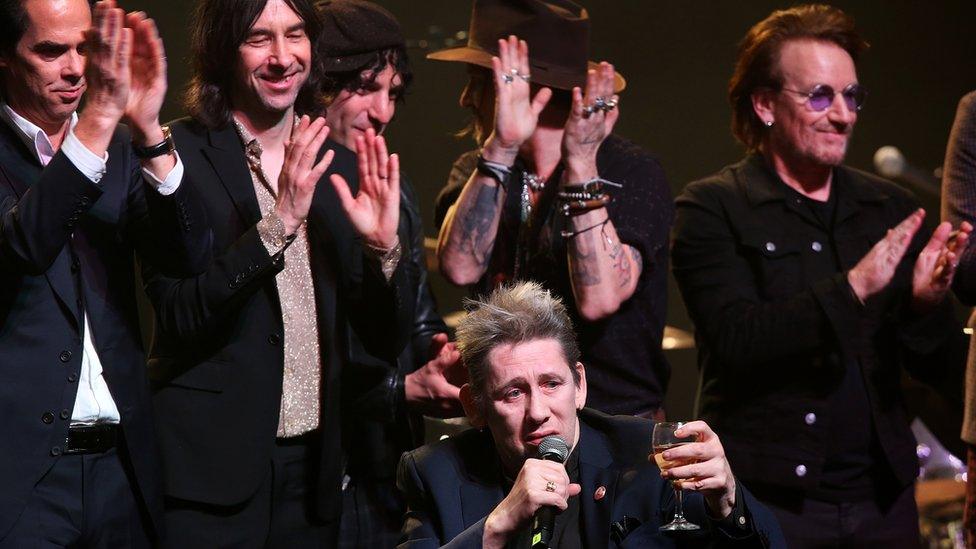A life too interesting: Shane MacGowan
- Published
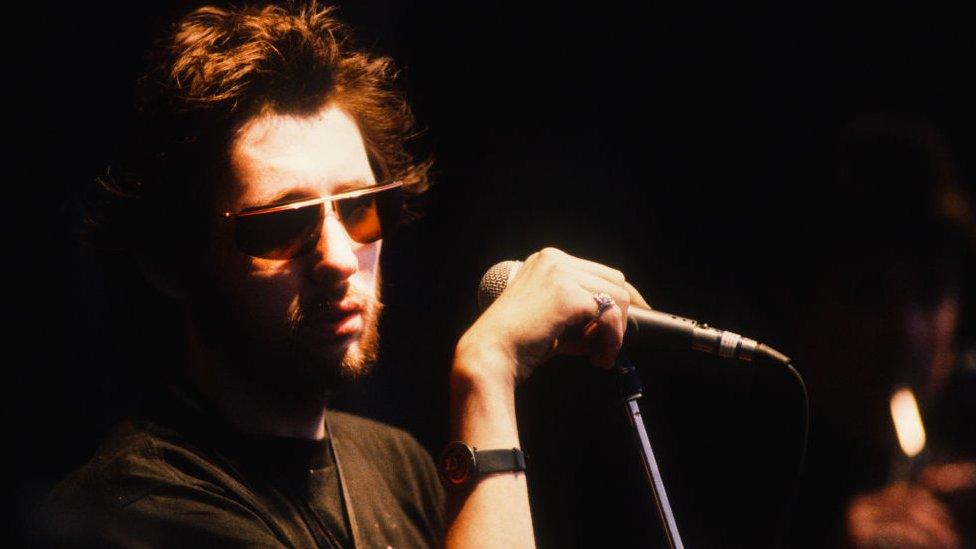
Shane MacGowan pictured in 1991 at Pukkelpop Festival
The songs of The Pogues are what happens when rural folk songs are hit over the head by the amphetamine punk spirit of 70s London.
But they are more than that.
These "gutter hymns" of the Irish abroad are celebrations of tough lives that are sprinkled with wit, literary references and simple truth telling.
Shane MacGowan once said: "I couldn't believe that nobody else were doing it, so we went on doing it ourselves…"
But the problem is that the story of Shane MacGowan the legendary drinker has overshadowed Shane the songwriter - and his best songs are remarkable.
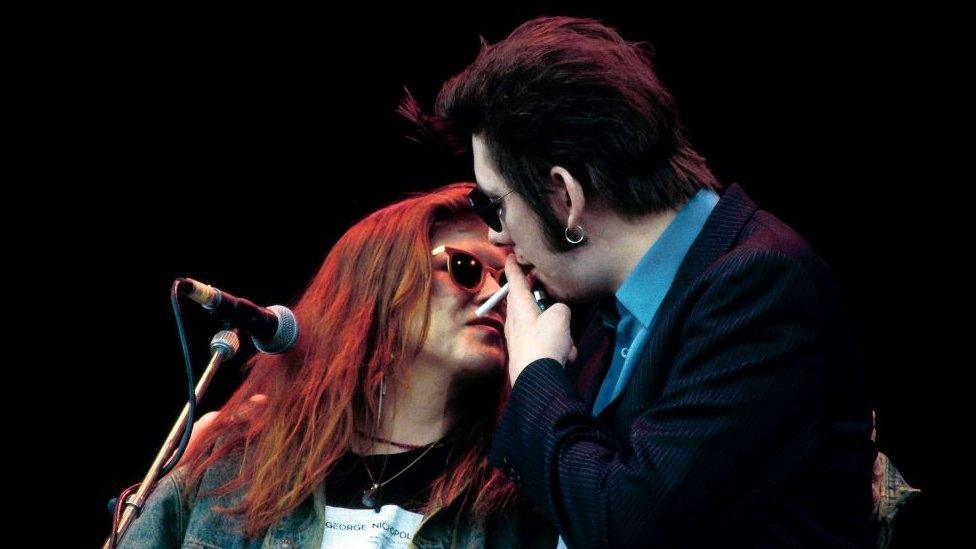
Shane MacGowan and Kirsty MacColl performing Fairy Tale of New York.
Take Fairy Tale of New York, it's a masterpiece because it captures the Christmas other festive tunes ignore.
It's a celebration of those bleak December days of rumination on mistakes made or married:
"I could have been someone.
"Well so could anyone.
"You took my dreams from me when I first found you."
This video has been removed for rights reasons
It takes a rare talent to turn a grim truth of this midwinter festival of drink, regret and loneliness into the one Christmas song that never seems to overstay its welcome.
However, the man himself almost went out of his way to keep us from seeing it.
Interviews and profiles begin with stories of journalists waiting for hours in Dublin bars.
There are descriptions of stained clothing, missing teeth and his laugh, which the Daily Mirror compared to "a cross between a rattlesnake's hiss and a portable toilet being flushed".
But there's not much about how well-read he was, or what his songs were about.
For a man who came from a culture that prizes conversation as a high art form, and has provided more than its fair share of hyper-articulate storytellers, he was famously uncommunicative with journalists and writers.
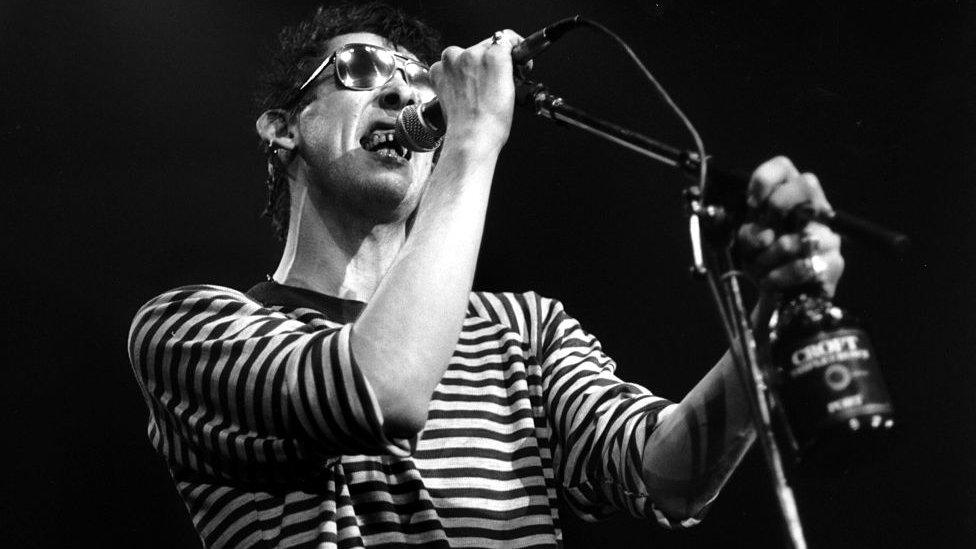
MacGowan is captured in action performing with The Pogues
His official biographer, Richard Balls, once compared interviewing him to making a wildlife documentary.
It was a matter of waiting hours and hours in the hope he might give you some brief insight into a songwriter who had quite clearly read a lot books. Thankfully, we can get a sense of his literary tastes by listening to the records.
The literary punk
The Pogues' album, Red Roses for Me, is named after a Sean O'Casey play.
Streams of Whiskey is a tribute to a MacGowan hero and inspiration, the poet and playwright Brendan Behan, who once described himself as a "drinker with a writing problem". (Which is perhaps a fair description of Shane himself).
The dark humour lurking in the descriptions of hardship and squalor is an echo of another favourite of his, Flann O'Brien. His songs are a reminder of the time before the Celtic Tiger when young people fled Ireland in search of work. a world that has inspired a library of books, plays and poetry.
And listening to his songs it's no surprise that MacGowan was, in his youth, a reader.
Shane's father, Maurice, who also described himself as something of a "roustabout", would, he said, try to read James Joyce's famously impenetrable, Finnegan's Wake with an 11-year-old Shane.
And, if you waited long enough, and won his confidence, MacGowan the reader might occasionally emerge with his views on Yeats, Joyce and Beckett.
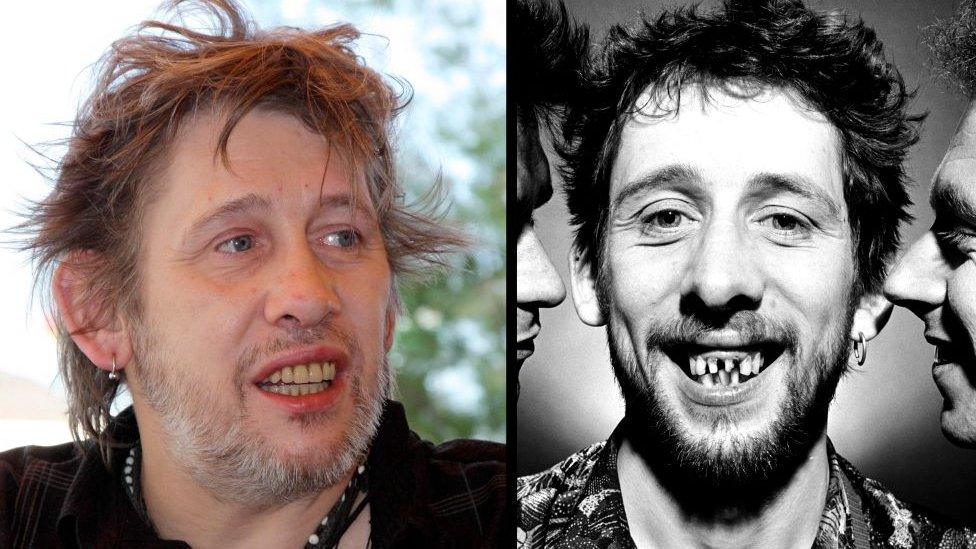
His dental transformation involved 28 new teeth
Take the moment when a roomful of dentists burst into a round of applause when Shane finally managed to eat an apple after seven years of total toothlessness.
His 28 new teeth were described as the "Everest of Dentistry", there was even a special TV programme devoted to the story of their nine-hour installation, and the anxiety that the new teeth might wreck the distinctive rasp of what was left of the MacGowan voice.
And, along with the teeth, were the endless stories of the drinking.
In one biography, written by his wife, Victoria, there was a description of why travelling was so difficult; the airlines frequently refused to allow him on the aircraft.
On one attempt to reach a gig with Bob Dylan, four planes came and went. And Shane himself was, at times, happy to add to the stories of "Shane the Drinker", recounting that he was given Guinness when he was five years old and downing whiskey at eight.
His departure from The Pogues was also, inevitably, preceded by an epic bender. It took place on a Japanese train where MacGowan discovered the joys of sake, and fell out of the carriage knocking himself unconscious.

He was using a wheelchair in 2022
But while the endless cycle of drinking and drying out clinics destroyed his relationship with the band it did not seem to puncture the admiration or allure.
He was, he said, wary of strangers but he never seemed short of famous friends. It was U2's Bono who lent him a Martello Tower to live in when he parted from The Pogues and it was Sinead O'Connor who famously reported him to the police when she despaired of his heroin habit.
He was not too happy about that but on his 60th birthday party in Dublin, there she was, along with Bono, Nick Cave, Johnny Depp and the Irish President, Michael D Higgins all paying honour.
Nobel laureates would have been jealous of the adulation.
At the end of the evening it felt like the arrival of royalty as the musician was wheeled on stage and everyone stood around staring at this ravaged, immobilised figure.
He had some years before broken his pelvis in a dancing accident. One can assume strong drink may have been involved.
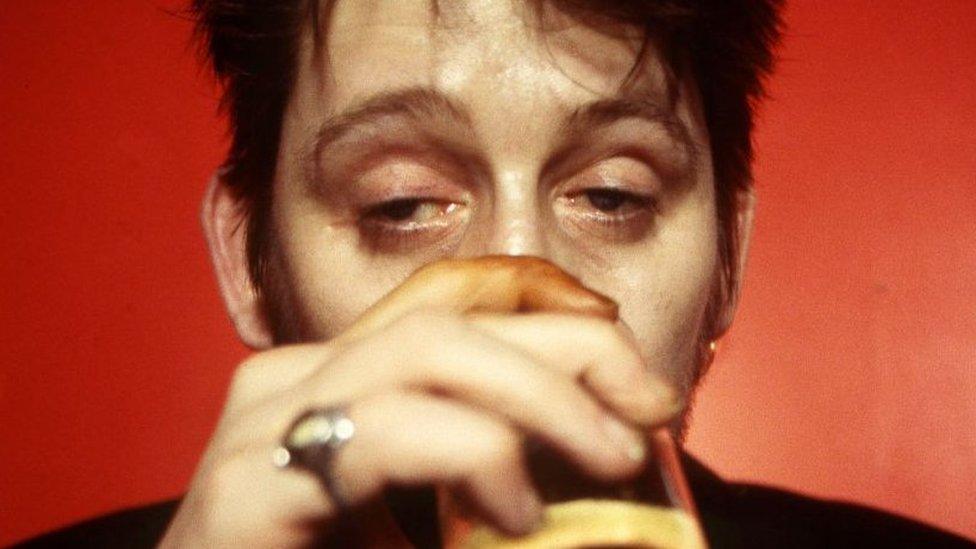
MacGowan is pictured, drink in hand, in 1997
It seems everyone who ever met him has a story.
He shares a place in culture alongside Dylan Thomas, George Best and Keith Richards. It's a pity his drink, drugs and near death excesses have overshadowed the music, because in an era of glossy, MTV friendly, over-produced, rah-rah skirted pop, he was the perfect counterpoint.
The 1980s really needed a peg toothed, dishevelled, drunken Irish punk poet in the charts, albeit one who was actually born in Tunbridge Wells.
Surprised?
Once again, the story rather than the music grabs your attention.
His birthplace, leafy, well-to-do Kent, was not a fact he often volunteered. It happened, he said, only because his mother had gone into labour on Christmas Day while visiting family.
He was a proud Irishman. Nevertheless, while his early childhood was in Tipperary, his schooling was a prestigious English prep school, Holmewood House and then a scholarship to public school, Westminster. He was soon expelled.
At 12 he was reading Dostoyevsky, at 17 he had his first spell in rehab after developing an addiction to Valium. The cycle had begun.
He was first told he had six weeks to live in the late 80s. MacGowan's survival defied medical science and became part of the myth.
Remember the songs
His story is a page-turning catalogue of events both fascinating and frightful, but don't forget the songs.
And so, let's end with a MacGowan lyric, a little something for this moment of farewell, to what felt like a near immortal hell raiser, from The Pogues' song The Sick Bed of Cuchulainn.
"They'll take you from this dump you're in and stick you in a box.
"Then they'll take you to Cloughprior and shove you in the ground.
"But you'll stick your head back out and shout, 'We'll have another round.'"
Related topics
- Published30 November 2023
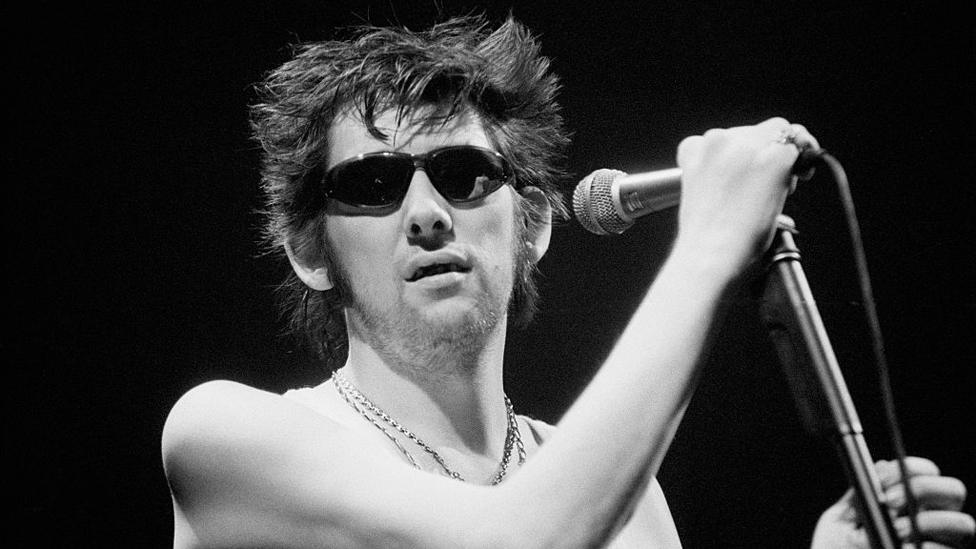
- Published30 November 2023
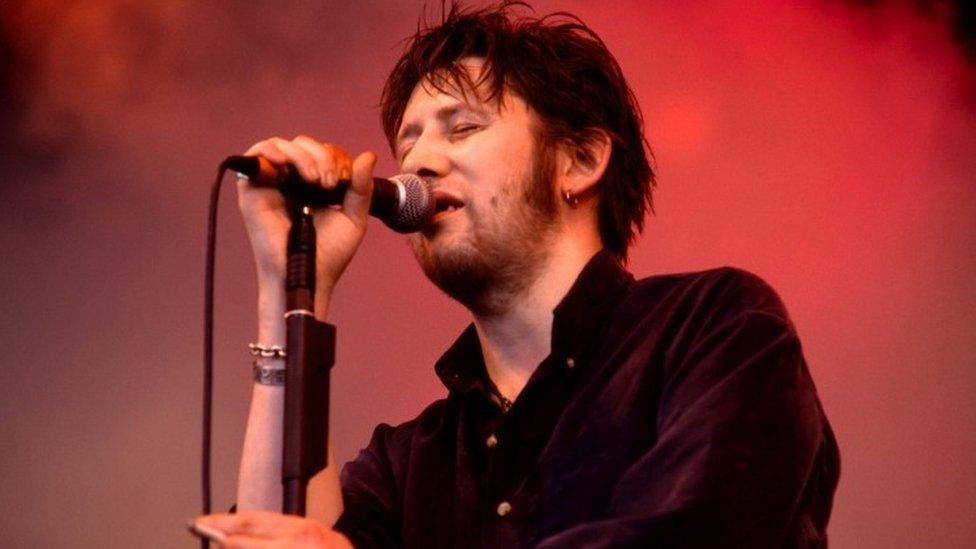
- Published23 November 2023
- Published19 November 2020
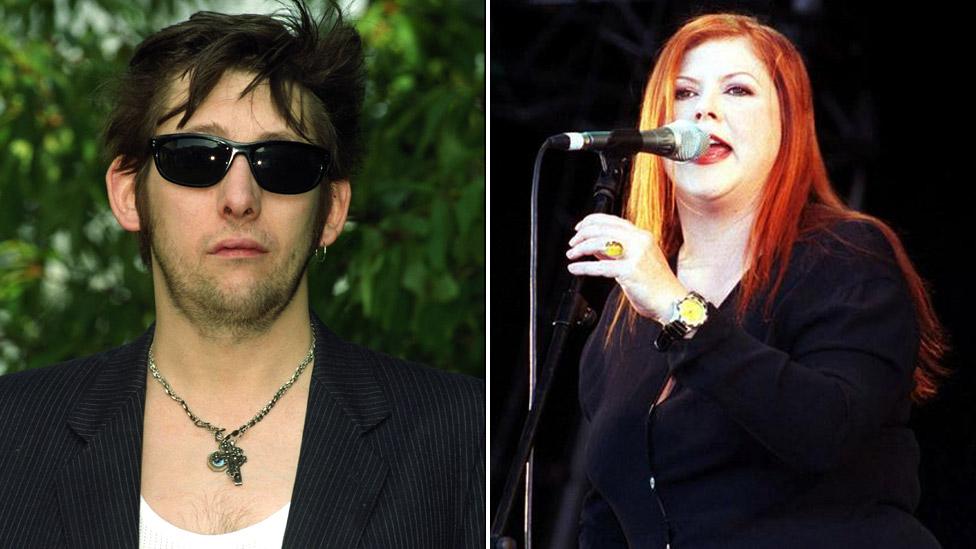
- Published30 November 2020
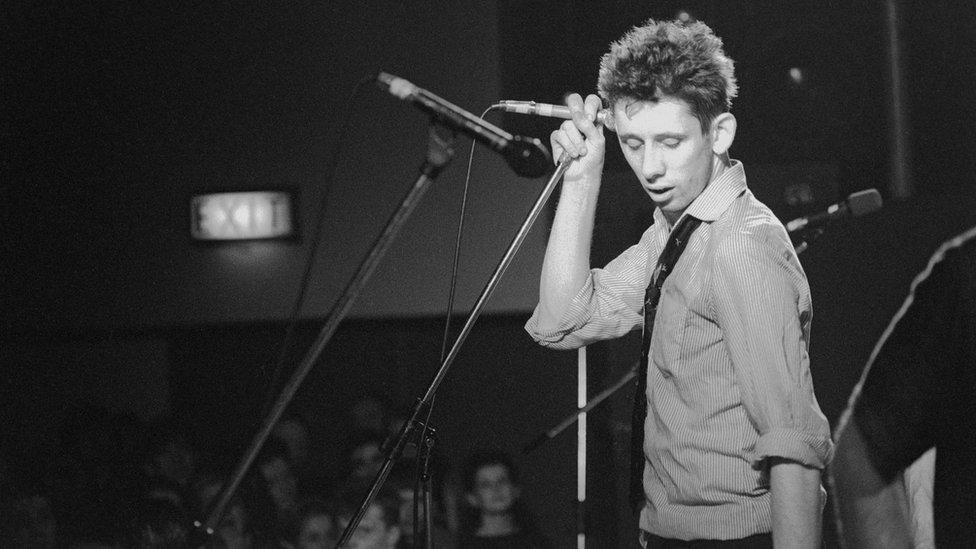
- Published16 January 2018
